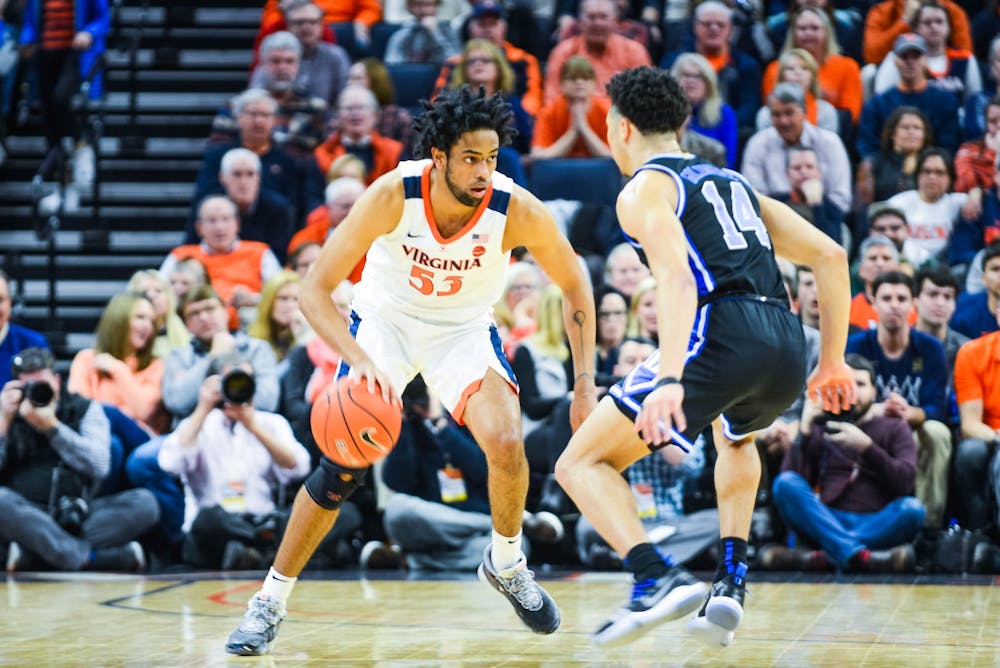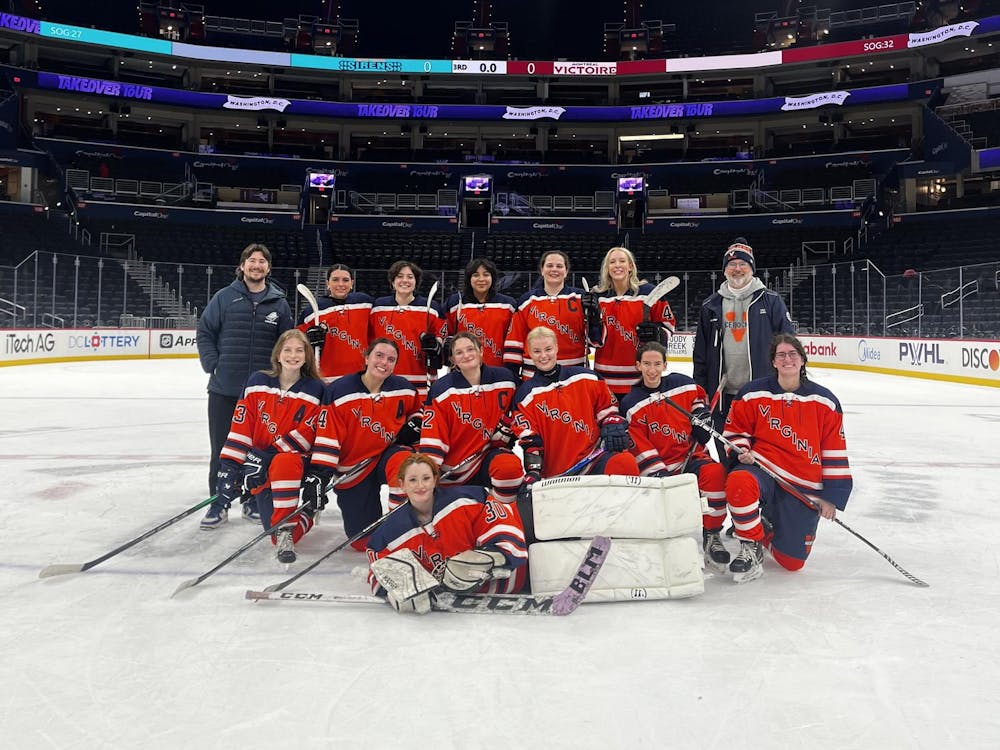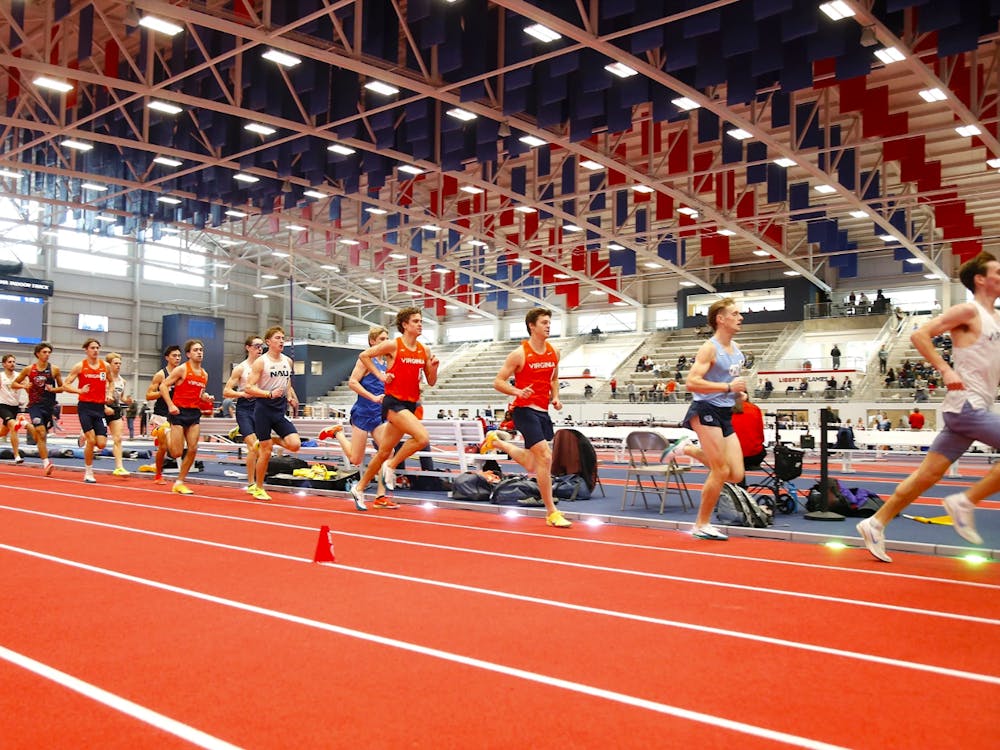On Dec. 26, it looked like Virginia men’s basketball was not what the pundits said it would be prior to the season. Starting their 2020-21 campaign ranked No. 4 in the AP preseason poll, fans and media members alike were effusive in their praise of the Cavaliers, but as a late Christmas present, No. 1 Gonzaga left a chunk of coal in Virginia’s stocking — defeating the defending national champions 98-75.
Fast-forward a month, and the Cavaliers have turned the corner in pursuit of a second consecutive national championship in men’s basketball. While losses to the Bulldogs and unranked San Francisco undermined the promise of a team still finding its identity, the Cavaliers have gone on a tear in ACC play, looking more like the ACC-leading team fans expected.
In traditional Virginia fashion, the grittiness and durability of the pack line defense has allowed the Cavaliers to return once again to an elite level of play. A combination of improved shooting, balanced offensive production and a stingy defense has given Virginia the upper hand over its past seven opponents in ACC play.
Furthermore, no one can question Coach Tony Bennett’s uncanny ability to salvage dominant teams out of harrowing defeats. The most recent loss to Gonzaga, much like the Cavaliers’ December 2019 flop at Purdue, has done the necessary deed of revealing gaping flaws in both the offensive and defensive units.
The 2013-2014 Virginia team faced challenges similar to the problems the current roster faces. Having been throttled by unranked Tennessee 87-52, a national embarrassment for a team with a respectable record of 9-3, the Cavaliers shook off the rust and finished the rest of the regular season with 16 wins and only two losses.
The Gonzaga loss only exposed the 2020 Virginia team to the cruelty of the national spotlight and the difficulty of learning the pack line defense. The system particularly impacted the likes of newcomers freshman guard Reece Beekman, senior forward Sam Hauser and junior guard Trey Murphy III.
A Bennett-coached lineup does not typically give up a lot of points on an average night, let alone as many as 98. To lose in such an emphatic fashion strays ever so far from the norm of Virginia basketball, yet one must remember that the ‘Zags — already the No. 1 squad in the nation — shot a ridiculous 50 percent from the three-point arc, feasting upon the main weakness of the interior-focused pack line.
The national embarrassment has, ironically, catapulted Virginia to the top of the ACC. To find out how Bennett has righted the ship, let’s examine the key pieces and adjustments the Cavaliers have made that have drastically altered the course of this season.
An Improved Defense
Gonzaga — led by All-American candidates freshman guard Jalen Suggs, sophomore forward Drew Timme and senior forward Corey Kispert — caused issues for the Cavalier defense by continuously finding ways to avoid the entanglements of the pack line. Employing excellent continuity ball screens to free up shooters — mainly Kispert, who made nine out of 13 three-point attempts — the Bulldogs preyed upon the relatively inexperienced Virginia team from the outside yet also stretched the defense thin with advantageous one-on-one matchups inside.
Hauser and senior forward Jay Huff — who were left on an island because of Gonzaga’s threats on the wings — were unequipped to handle the crafty Timme, who finished the game with 29 points in only 28 minutes.
Granted, Virginia will likely not face another team so rich in talent and versatility. The lack of double teams in the frontcourt, struggles with hedging and recovering by forwards Huff and Hauser and inexperience ultimately doomed Virginia against arguably one of the best teams of this decade. However, due to a lighter schedule and a bevy of adjustments, this defense has been restored to its usual level of play.
Thanks to the implementation of the “Most Important Guy,” the frontcourt player who hedges near the three-point line is able to receive off-ball help from a teammate — the MIG — two passes away. Therefore, the Cavaliers ensured that their defense would duly account for quick passes off of the hedge, since Huff and Hauser often struggled to recover completely against Gonzaga. Against Clemson on Jan. 16, the pack line defense held the No. 12 ranked Tigers to only 50 points and 21.7 percent from three-point range.
In the seven games following the Gonzaga debacle, the Cavaliers have contained teams to 58 points a game — a stark improvement from the 23 point loss.
A Balanced Offense
Save the Cavaliers’ recent wins against Georgia Tech and Syracuse — in which Huff and Hauser combined for 82 of the team’s 145 total points — scoring has been distributed relatively evenly across the often seven-man lineup. Unlike past Virginia teams, this current roster can rely on its depth and versatility for scoring rather than only one or two players.
Against Clemson, five Cavaliers scored in double figures, marking one of the only occasions that a Bennett-coached team has done so. The lack of one true “go-to” player has opened the door for players such as senior guard Tomas Woldetensae and sophomore guard Casey Morsell to cash in on offense.
Woldetensae showed flashes of brilliance with a 14-point performance against Clemson — making four of six three-point attempts — while Morsell put on perhaps his most impressive offensive output since last year’s showdown against Arizona State — hitting nearly all of his shots and posting 15 points against Notre Dame.
No longer does junior point guard Kihei Clark have to worry about shouldering the burden all by himself. The emergence of Huff and Hauser has particularly allowed Clark to concern himself more with his ball-handling and court vision rather than carrying Virginia with his scoring. It also is apparent that the Cavaliers have improved greatly in the area of three-point shooting, especially in regards to last year’s porous offensive team.
Bennett can deploy Woldetensae and Murphy for three-point specialization, yet he can also count on Hauser and Huff for success in the mid-range. While the Georgia Tech game bordered on ugly for a considerable period of time, the Cavaliers inched themselves back via the formidable duo of Huff and Hauser — especially on a night when Clark struggled tremendously on the offensive side of the ball.
Expect more of a balanced approach to continue in ACC play as surprise contributors such as Murphy and Morsell grow more confident in their roles.
The Cavaliers continue their quest for a fourth ACC championship and second national title Saturday against Virginia Tech in Blacksburg. Tip-off at Cassell Coliseum is set for 6 p.m. and the game will be broadcast live on the ACC Network.







